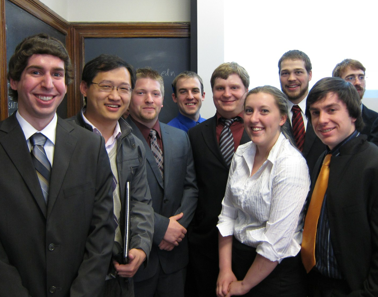
Since the mid-2000s, the favorable political atmosphere towards nuclear energy has provided an exciting stimulus to the nuclear industry and NE departments nationwide as the U.S. firmly embraces a national policy based on energy security and environmental sustainability. Such a renewed interest in nuclear energy is also fueled by a strong demand for electricity in rapidly emerging overseas markets, especially in China and India where new nuclear power plants are being constructed. The past five years marked the beginning of what is widely considered to be a “nuclear renaissance” in U.S. history, when the nuclear power industry and the U.S. Department of Energy dramatically increased investment in nuclear engineering research, development, and education at a level unprecedented in the past 30 years. The recent Fukushima nuclear accident in Japan, while reminiscent of the Three Mile Island accident and its impact on nuclear power industry in the 1990s, has apparently not had a negative effect on the long-term roadmap for nuclear energy development in the U.S. On the other hand, the increased awareness of nuclear safety issues at a global scale will likely result in new research and educational opportunities. The Nuclear Engineering program at Rensselaer is accredited by the Engineering Accreditation Commission of ABET, https://www.abet.org, under the commission’s General Criteria and Program Criteria for Nuclear, Radiological, and Similarly Named Programs.
DEGREES OFFERED
| Nuclear Engineering: | B.S., M.Eng., M.S. |
| Nuclear Engineering and Science: | Ph.D. |
NUCLEAR AT A GLANCE
Currently, the Nuclear Engineering program is home to over 100 undergraduate and graduate student. With focuses on reactor physics and design, thermal-hydraulics, health physics, and fusion engineering, the Nuclear Engineering program offers a diverse set of courses to fit almost any curriculum. Additionally, the program includes a competitive Senior Design Program, maintains two world-class research facilities, and is home to a highly active student section of the American Nuclear Society.
The RPI NE Difference
Rensselaer launched its plan for NE research in the late 1950s when the Atomic Energy Commission funded a project to construct a linear electron accelerator in 1958. The NE Department was officially formed in 1960 and is one of the oldest such programs in the U.S. The construction of the accelerator facility was completed in 1961 and the facility would soon be named after Professor Gaerttner who was instrumental in establishing NE at Rensselaer and who served as NE’s first departmental head. Within a few years, the NE Department at Rensselaer awarded its first PhD degrees and then B.S. degrees. At Rensselaer, concentrations are available in fission reactor physics, reactor engineering, health physics, thermal-hydraulics, reliability and safety, and fusion engineering. Boasting unique and state-of-the-art research facilities, Rensselaer students have access to a critical reactor, a large electron accelerator, and modern computer interfacing technology. With today's need for inexpensive sources of energy, Rensselaer nuclear engineering graduates are in great demand for positions in industry or graduate study. Additionally, there are exciting possibilities in space power propulsion, fusion reactor engineering, medicine, and national defense.
APPLYING TO OUR PROGRAM
If you dream about changing the world, Rensselaer is the ideal place to begin your journey and the Nuclear Engineering Program would like to see your application. Whether you are a high school student considering RPI for undergraduate work or a graduate looking to complete a masters or doctorate in Nuclear Engineering, please use the link below for more information about the application process and program requirements.
LOOKING TO VISIT OUR CAMPUS?
We would love to have you visit. Contact one of our program officials and we can work to arrange visits for prospective students: you’ll get to meet with current students (graduate and undergraduate), professors, faculty, and NE groups on campus.